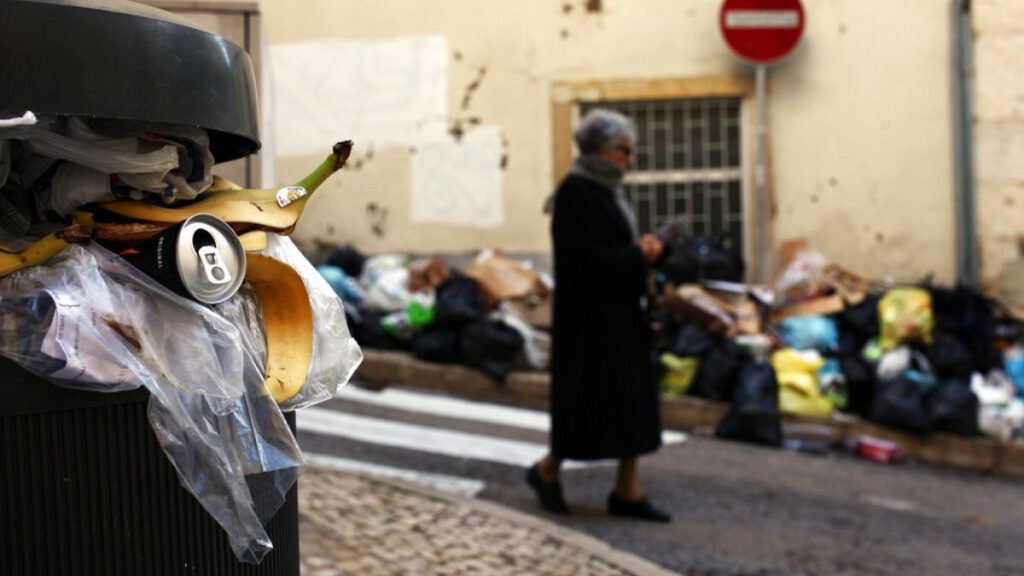Lisbon, the vibrant capital of Portugal, finds itself amidst a mounting waste crisis as municipal waste collection workers initiated a two-day strike, leaving the city grappling with overflowing bins and accumulating garbage. The strike, organized by the Municipal Workers Union of Lisbon (STML) and the Local Administration Workers Union (STAL), coincides with the peak festive season, exacerbating the already heightened waste generation typical of this period. The timing of the strike, amidst the festive fervor, amplifies the disruption, casting a shadow over the holiday celebrations and raising concerns about public health and sanitation. The visual impact of uncollected refuse strewn across the city underscores the critical role these workers play in maintaining urban hygiene and highlights the urgency of addressing their concerns.
The striking workers are demanding improved working conditions, accusing the city authorities, led by Mayor Carlos Moedas, of failing to honor previous agreements and adequately address the challenges they face. Key among their demands are upgrades to worker facilities, provision of proper meal spaces, and a halt to the outsourcing of cleaning services to private companies, a practice the unions vehemently oppose. The STML, in particular, has criticized the council for not adhering to commitments made in a June 2023 agreement, accusing the administration of neglecting the core issues plaguing the urban cleaning sector and prioritizing short-term solutions over addressing the underlying systemic problems. This perceived breach of trust fuels the workers’ discontent and reinforces their resolve to push for meaningful changes.
The impact of the strike is palpable across Lisbon, with residents venting their frustration on social media platforms, directing their criticism towards Mayor Moedas and his administration for their perceived mismanagement of the city’s waste management system. The overflowing bins and accumulating rubbish not only detract from the city’s aesthetic appeal but also pose potential health risks, particularly during the warmer months. The disruption to daily life caused by the strike underscores the essential nature of waste management services and the importance of ensuring the well-being and fair treatment of the workers who provide them.
Recognizing the gravity of the situation, Lisbon City Council has deployed additional bins for organic and recyclable waste in an attempt to mitigate the impact of the strike. However, these measures are acknowledged as temporary fixes, inadequate to address the underlying issues driving the workers’ actions. City Council representative Pedro Moutinho admitted to delays in fulfilling some of the union’s demands but insisted that progress is being made and that the June 2023 agreement will be fully implemented. This assurance, however, has failed to appease the striking workers, who remain steadfast in their demands and skeptical of the council’s commitment to meaningful change.
The unions have announced further strike actions, including a full strike on December 26 and 27, an overtime ban between Christmas and New Year’s Eve, and another strike affecting both normal and overtime work in the early hours of January 2nd. This escalation of industrial action reflects the depth of the workers’ dissatisfaction and their determination to secure concrete improvements to their working conditions. The extended period of disruption threatens to further strain the city’s waste management system and intensify the pressure on the authorities to find a resolution.
The ongoing waste crisis in Lisbon highlights the complex interplay between labor rights, municipal governance, and essential public services. The striking workers, represented by their unions, are demanding not only improved working conditions but also recognition of their vital role in maintaining the city’s health and hygiene. The city council, facing mounting pressure from residents and the looming threat of further disruptions, must find a way to address the workers’ concerns while ensuring the continued provision of essential waste management services. The resolution of this crisis will require a commitment to dialogue, compromise, and a recognition of the shared responsibility for maintaining a clean and functional urban environment.

